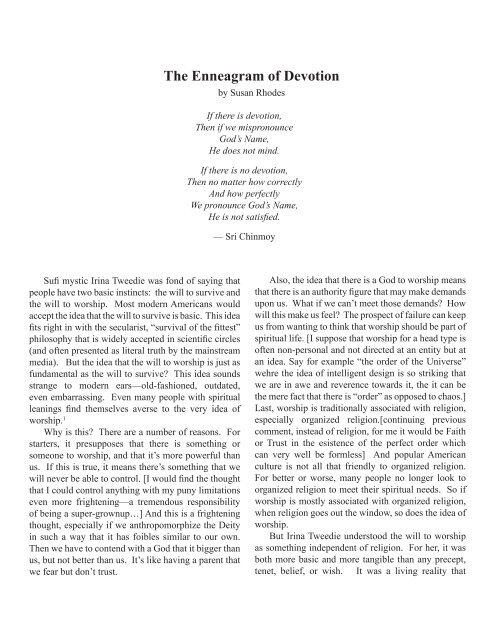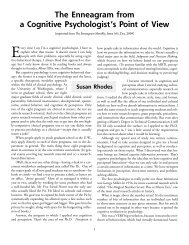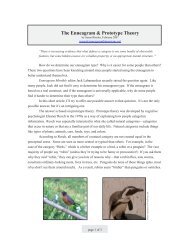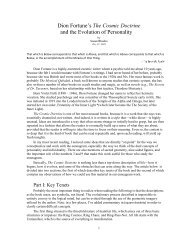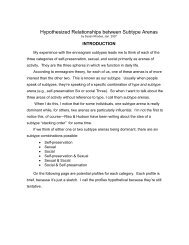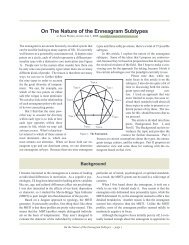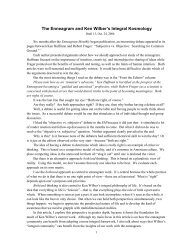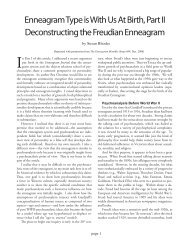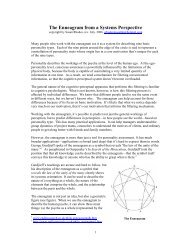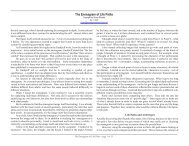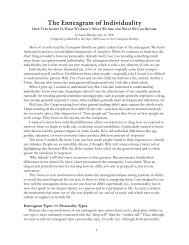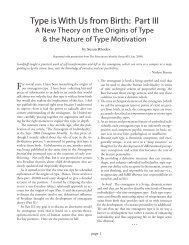The Enneagram of Devotion - Enneagram Dimensions
The Enneagram of Devotion - Enneagram Dimensions
The Enneagram of Devotion - Enneagram Dimensions
Create successful ePaper yourself
Turn your PDF publications into a flip-book with our unique Google optimized e-Paper software.
<strong>The</strong> <strong>Enneagram</strong> <strong>of</strong> <strong>Devotion</strong>by Susan RhodesIf there is devotion,<strong>The</strong>n if we mispronounceGod’s Name,He does not mind.If there is no devotion,<strong>The</strong>n no matter how correctlyAnd how perfectlyWe pronounce God’s Name,He is not satisfied.— Sri ChinmoySufi mystic Irina Tweedie was fond <strong>of</strong> saying thatpeople have two basic instincts: the will to survive andthe will to worship. Most modern Americans wouldaccept the idea that the will to survive is basic. This ideafits right in with the secularist, “survival <strong>of</strong> the fittest”philosophy that is widely accepted in scientific circles(and <strong>of</strong>ten presented as literal truth by the mainstreammedia). But the idea that the will to worship is just asfundamental as the will to survive? This idea soundsstrange to modern ears—old-fashioned, outdated,even embarrassing. Even many people with spiritualleanings find themselves averse to the very idea <strong>of</strong>worship. 1Why is this? <strong>The</strong>re are a number <strong>of</strong> reasons. Forstarters, it presupposes that there is something orsomeone to worship, and that it’s more powerful thanus. If this is true, it means there’s something that wewill never be able to control. [I would find the thoughtthat I could control anything with my puny limitationseven more frightening—a tremendous responsibility<strong>of</strong> being a super-grownup…] And this is a frighteningthought, especially if we anthropomorphize the Deityin such a way that it has foibles similar to our own.<strong>The</strong>n we have to contend with a God that it bigger thanus, but not better than us. It’s like having a parent thatwe fear but don’t trust.Also, the idea that there is a God to worship meansthat there is an authority figure that may make demandsupon us. What if we can’t meet those demands? Howwill this make us feel? <strong>The</strong> prospect <strong>of</strong> failure can keepus from wanting to think that worship should be part <strong>of</strong>spiritual life. [I suppose that worship for a head type is<strong>of</strong>ten non-personal and not directed at an entity but atan idea. Say for example “the order <strong>of</strong> the Universe”wehre the idea <strong>of</strong> intelligent design is so striking thatwe are in awe and reverence towards it, the it can bethe mere fact that there is “order” as opposed to chaos.]Last, worship is traditionally associated with religion,especially organized religion.[continuing previouscomment, instead <strong>of</strong> religion, for me it would be Faithor Trust in the esistence <strong>of</strong> the perfect order whichcan very well be formless] And popular Americanculture is not all that friendly to organized religion.For better or worse, many people no longer look toorganized religion to meet their spiritual needs. So ifworship is mostly associated with organized religion,when religion goes out the window, so does the idea <strong>of</strong>worship.But Irina Tweedie understood the will to worshipas something independent <strong>of</strong> religion. For her, it wasboth more basic and more tangible than any precept,tenet, belief, or wish. It was a living reality that
permeated every moment <strong>of</strong> every day. Her convictionthat the will to worship is basic to life arose out <strong>of</strong> bothmystical experience and the wisdom gained from along life <strong>of</strong> service. [sounds like Worship could be alsocalled Gratitude. One requires an object the other doesnot. I can conceivably feel exhilarated with a sense<strong>of</strong> “joi de vivre” and nothing further. Each time whendiscovering a new connection or law, marvel in awe atthe its existence]<strong>The</strong> Yin-Yang Nature <strong>of</strong> LifeWhy are there just two basic instincts? Because <strong>of</strong>the yin-yang nature <strong>of</strong> life. It’s not hard to recognizethe will to survive as the masculine drive and the willto worship as its feminine counterpart; the masculinehelps us lead and control [will to rule, i.e. take charge,i.e. Mr. Fix it] while the feminine shows us how tosurrender and give. Unfortunately, the feminine orsubmissive role is [was, rather, and thus got furtherinvalidated by the feminist movement that instead <strong>of</strong>pointing out the need for and nobility <strong>of</strong> that path,adamantly condemned it as indeed inferior] no longerwidely-esteemed, because it’s become associated withunfairness in general and the exploitation <strong>of</strong> women inparticular.Nevertheless, both roles are necessary for abalanced life. While it’s true that submission caninvite exploitation, it’s not submission itself that is theproblem—it’s our lack <strong>of</strong> discrimination about when tosubmit and to what (or to whom).For my article on Cesar Millan, the “DogWhisperer,” (see EM, Dec. 2007****), I researchedCesar’s philosophy <strong>of</strong> life, and much <strong>of</strong> it relies onknowing how to work with masculine and feminineenergy. In one <strong>of</strong> his TV shows, Cesar comments that,“submission is when the mind is open. When the mindis open, you allow other people to tell you things.”Similarly, all Twelve-Step programs ask theirparticipants to acknowledge their powerlessnessagainst their addiction and ask them to acknowledge thepresence <strong>of</strong> a Higher Power in their lives. It’s not thattheir organizers are trying to convert their participantsto some religion—it’s that they understand that theonly way that people are ever going to gain controlover their lives is by first letting go <strong>of</strong> a false sense<strong>of</strong> control. And this is possible only when we look at2ourselves in a realistic way—when we realize that weare actually a small fish in a very big pond.<strong>The</strong> Power <strong>of</strong> SurrenderSurrender opens us to our own vulnerability, andwe can no longer pretend to be something we arenot. Our self-image collides with the reality <strong>of</strong> whowe really are[what two worlds?] —and our defensescollapse. And we suddenly experience the terrifyingand dizzying sensation <strong>of</strong> feeling fully present in themoment. Or perhaps it happens more gradually (butno less ruthlessly)—our illusions slowly slip away, oneby one, until we are eventually left with only ourselvesfor company. However we arrive at this moment, it’s astark experience. Everything has been stripped away.We are like a newborn foundling, naked and alone.But we are also receptive—we are, as Cesar notes,ready to listen. And it is in this state <strong>of</strong> “listening silence”that we begin to hear the voice <strong>of</strong> the inner heart. [whatif listening could be to our own sense <strong>of</strong> beauty (gut),feeling (heart) and values/thoughts (head) according towhich happens to be the main center, the support and/or the repressed one] It speaks to us and sings to us,sweet songs <strong>of</strong> love. It awakens in us a sense that thereis something missing [that’s pretty Fourish, isn’t it?]from the world, some unlived potential, and that thispotential is ours alone. And it fills us with inspiration,gradually igniting the inner flame <strong>of</strong> devotion [we stilldon’t know TO what] out <strong>of</strong> which true conviction [orOF what?]is born.Implicit here is the notion that Life is not an abstractidea, but something full <strong>of</strong> energy and animation,something marvelous and sublime. Moreover, it issomething that is capable <strong>of</strong> responding to our call,although Sufis <strong>of</strong>ten say it is Life that calls to us first,not the other way around. [that evokes a sense that thatwhich responds is outside/elsewhere and may cometo us after we call it] It is because Life is responsivethat it’s actually possible to surrender completely—because Life is always there to support us, whetherwe know it or not. If we’re able to see Life in thislight, it’s possible to come to the surprising conclusionthat the will to survive and the will to worship are notactually in conflict. Both enable us to prosper, albeitin different ways. <strong>The</strong> will to survive helps us carefor the physical body and appreciate the individual self
As this poem relates, even the most powerfulamong us is not powerful enough to defeat the passingaway <strong>of</strong> everything we think we control. That controlis, at best, temporary. That’s the “bad news.” And it’sterrifying to that not-so-grownup part <strong>of</strong> us that thinksit’s in charge. <strong>The</strong> good news is that when we let go<strong>of</strong> the false sense <strong>of</strong> control, we discover that we don’tneed so much control to be content. In fact, just theopposite. We find that nature really does support andnurture us, if we allow it. But it can only happen whenwe stop trying to boss it around! [example: Somewherein Africa natives were poor because the tsetse fly waskeeping their herds thin. DDT was used to knock outthe tsetse. <strong>The</strong> herds multiplied and the natives werethrilled until the herds ate more grass than could bereplenished and what grasslands there were before,now turned into a dustbowl. <strong>The</strong> herds starved leavingthe natives with less than they had when they sharedwith the tsetse…On the other hand, a well placed dam and irrigationsystem achieved good results]<strong>The</strong> problem is that many <strong>of</strong> us are completelyterrified by this prospect, especially in highlytechnological cultures. We rely so heavily on scienceand technology in daily life that we’ve forgotten thatthese are not our only sources <strong>of</strong> support. Nor arethey the most powerful sources <strong>of</strong> support. In times <strong>of</strong>real trouble—like the aftermath <strong>of</strong> 9/11 or the Pacifictsunami—people drop the pretense <strong>of</strong> control, becausethey can no longer maintain it. We ask for help, andit comes; it always comes when we aren’t too proudto ask. And <strong>of</strong>ten, the help has a quality about it thatinspires and elevates us.Acceptance and <strong>Devotion</strong>Help comes once we come to a place <strong>of</strong> acceptance.In that acceptance, we gain perspective. We discernwhat is really important in life.This idea was poignantly brought home to merecently when I watched a TV program on lotterywinners. One <strong>of</strong> the people interviewed for the showwas the daughter <strong>of</strong> a woman who won several milliondollars. <strong>The</strong> daughter was pleased for the win, but notnearly as excited as you would expect. She quietlyobserved, “Well, yes, it’s nice. Of course, it’s not likehaving good health.” It turns out that her mom hadrecently been diagnosed with multiple sclerosis.It may seem strange to think that acknowledging ourlimitations is a starting point for a more harmonious way<strong>of</strong> life. But it’s not really. In Twelve-Step programs,everybody rejoices when a newcomer is able to admittheir powerlessness over the circumstances <strong>of</strong> their life.This is the moment when we become dis-illusioned,when we finally see our false ideals, destructiveemotions, and spiritual illusions for what they are. Thiswillingness to see what is false in ourselves becomesour first step toward recovery.And just what is it that we are recovering? It’sour innocence—our “inner sense.” Regaining ourinnocence is what happens when we let go <strong>of</strong> selfdefeatingillusions. This results in the realignment<strong>of</strong> the masculine and feminine sides <strong>of</strong> our being, sothat we become balanced human beings. <strong>The</strong> outcomeis threefold: mentally, we acquire discernment;ontologically, we experience a zest for life; andemotionally, we feel quietly happy.[this sounds oddly transsexual. I believe thatwithin the relative the masculine and feminine hasto persist to the end. Balance would then be differentfor males and females. To become balanced wouldbe harmonizing those properties but maintaining thehierarchy among them. Males will still have a spatialengineering edge over women who’d keep theircommunication/empathizing edge.]Of course, theseare eventual outcomes; they don’t happen right away.And the process is seldom painless. That’s why it’susually a “one step forward, two steps back” sort <strong>of</strong>scenario for most <strong>of</strong> us. But it’s easier to persevere ifwe see that, in a very real sense, Life is on our side—itwants us to win, not lose. It’s supporting our effortsand cheering our successes. Maybe not in the way wewant, but certainly in the way we need.When life doesn’t tell us what we want to hear, itcan be difficult to stay open to the process. But staying4
open is important. Staying open enables us to receivethe life energy we need at each stage in our journey.Staying open also enables us to expand our horizons,so we grow in understanding. And it enables us tocultivate the kind <strong>of</strong> intimate relationship with life thatawakens feelings <strong>of</strong> joy and gratitude—feelings thatbecome the basis for a devotional way <strong>of</strong> life.<strong>Devotion</strong> in Daily LifeIt’s not so easy to cultivate a devotional way <strong>of</strong> life,because we live in a world that seems to have relegatedvirtues like acceptance, devotion, and innocence to thesame junk heap where we’ve tossed other discardedvirtues like purity, honor, and courage. As a result, it’seasy to lose the sense that there’s a place for devotionin daily life.I became aware <strong>of</strong> this all too clearly one day whenI was watching a TV interview with Mitch Snyder, afiery advocate <strong>of</strong> the homeless in the 1980s who wascompletely devoted to their welfare and to bringingtheir plight to public awareness. After listening toMitch explain his work at great length, the femalereporter—looking every inch the image <strong>of</strong> wellgroomedmodernity—got a puzzled look on her face,paused, and then asked the ultimate question: “Butwhat exactly do you get out <strong>of</strong> all this?”Mitch didn’t really know how to answer. But I’llbet he was thinking, “Wasn’t she listening to anythingI said?”Here was a guy whose work was his life. Hewasn’t in it for the money, the prestige, or the careeradvancement. He was following his heart. And shewasn’t getting it, not even a little bit. Like MotherTeresa, Mitch had found a task worth doing. And hewasn’t just doing it, he was living it.Wouldn’t it be great if all <strong>of</strong> us could care aboutour work as much as he did? I don’t think this isimpossible. It just requires the ability to be receptiveto the little voice within, so we give the devotionalside <strong>of</strong> our nature the chance to emerge. [this readslike the object <strong>of</strong> devotion is already our focus, justnot enough.Should the devotional side first seek outwhat it is that truly makes us WANT to embrace it?]Our caring need not be expressed in an obvious way(for instance, through an outward show <strong>of</strong> emotion).Nor does it need to involve some kind <strong>of</strong> unusual ordramatic activity (like feeding the starving or rescuingvictims in a fire). For many <strong>of</strong> us, it can be expressedin the way we live our ordinary lives and care for thepeople we love. Whatever we do, when devotion ispresent, we feel at peace. We understand what JosephCampbell meant when he talked about “finding yourbliss.”It sounds wonderful, doesn’t it, to find our bliss?Very peaceful and fulfilling. But just how do we do it?How do we find what moves us? And how do we bringthat inward devotion out into life? For some people,they just know. For others, it can be a lifelong search.<strong>Devotion</strong> and the <strong>Enneagram</strong><strong>The</strong> enneagram can be a wonderful guide toour devotional nature. This is because devotion isintimately connected with caring and commitment,and so is our enneagram type. Does this surprise you?It shouldn’t, because—just think about it—it’s our typethat dictates what matters most to us: intimacy (Type2), diversity (Type 7), authenticity (Type 4), etc. We<strong>of</strong>ten assume that the values associated with each typearen’t really values, but traps or defenses. And perhapsthey can be, if we don’t know how to properly channelour energy.But I find it hard to see fixation as inevitable. Tome, it makes more sense to see the energy <strong>of</strong> the typeas a natural set <strong>of</strong> tendencies that reflect somethingessential about inner self. From this perspective,knowing our type helps us come closer to mapping outwhat we may call our dharma, purpose, or life path.This is why discovering our type is a good way to “findour bliss.” 3 Recognizing our core motivation helps ussee what we value in life and what we notice mosteasily (our perceptual tendency). This in turn helps usdetermine how we might optimally respond to what wenotice (what I would call our devotional response).<strong>The</strong> table on the next page shows how I wouldbreak this down by type.5
TYPE Co r e m o t i vat i o n Pe r c e p t u a l t e n d e n c y & d e v o t i o n a l responseType 1 To perfect To notice small imperfections & tenderly correct themType 2 To nurture To notice gaps in emotional support & lovingly bridge themType 3 To aspire To notice opportunities to excel & joyfully seize themType 4 To authenticate To notice emotional incongruities & tactfully remedy themType 5 To teach To notice knowledge gaps & patiently fill themType 6 To serve To notice where service is needed & confidently provide itType 7 To link To notice potential connections & steadfastly make themType 8 To lead To notice where leadership is needed & chivalrously provide itType 9 To be present To notice the energy <strong>of</strong> the situation & consciously balance it<strong>The</strong> descriptions <strong>of</strong> core motivation and perceptualtendency will be familiar to anyone who knows theenneagram. However, what I call the devotionaltendency might sound like a stretch. You could easilyask, “How many Sixes act with confidence and howmany Sevens are steadfast in their follow-through?”Well, while it’s true that a devotional responseis a stretch. But a stretch is a stretch—it’s not animpossible dream. And that’s the whole point: thatthe energy <strong>of</strong> the type gives us special attentional giftsbut then challenges us to use those gifts in a way thatreally does them justice.Of course, it’s not a snap—it’s a challenge. Takethe example <strong>of</strong> Type 1. We know that it’s easy forOnes to notice imperfections (even little ones). Buthow easy is it for Ones to tenderly correct them? Notvery! Correction is easy—it’s the tender part thatcan be trying. Tenderness does not come naturally,because the same sharpness which makes Ones so goodat noticing details also gives them the tendency to besharp in their responses. But when we see a One who’sreally in touch with the devotional side <strong>of</strong> his nature,the sharp edges aren’t so evident. He’s less tense andmore relaxed. <strong>The</strong> focus <strong>of</strong> attention is broader andthe feedback he gives is a lot more diplomatic. It’simportant to realize that he hasn’t lost anything—likehis razor-sharp attentiveness to detail. He has simplygained the ability to respond in a way that allows hisgifts to shine.So it is with all the types. When devotion ispresent, it gives people more flexibility in the waythey respond to a given situation. Type 2 notices whenothers need help or social support, but is able to giveto them without feeling as though she is denying herown needs. Type 3 sees how to excel at what he doeswithout focusing so much on getting approval or otherexternal rewards. Type 4 notices emotional inhibitionin others, but is better able to accept it; as a result, she’sable to tactfully encourage (but not force) people to talkabout their true feelings. Type 5 notices how ideas arelinked and teaches other people according to the actualneed and interest <strong>of</strong> the student (not according to theFive’s need to be overly comprehensive or abstruse).Type 6 notices how it’s possible to be <strong>of</strong> service andrenders that service out <strong>of</strong> a place <strong>of</strong> assurance, not thedesire to please, show loyalty, or otherwise maintain adefensive posture. Type 7 sees all the possibilities in asituation without getting lost in them (and is thus ableto follow one or more through to completion). Type8 is aware <strong>of</strong> the power dynamics in a situation andexercises her natural ability to lead in a way that helpsothers to meet their goals (rather than exploiting the6
leadership position). Type 9 allows himself to be fullypresent to the situation, so that he brings balance to thesituation based on his inner knowing (not his desire forpeace at any price).Do these scenarios sound like a pipedream? Ihope not! I can think <strong>of</strong> people <strong>of</strong> each type who fitthese descriptions, people who have found a way tolet devotion into their lives in a way that opens, heals,and transforms. <strong>The</strong>y are not doormats, because theirreceptivity is tempered by discernment. <strong>The</strong>y knowwhat their gifts are and how to use them with care.This knowledge is available to each <strong>of</strong> us. Wecan each cultivate the kind <strong>of</strong> receptivity that gives usaccess to our own special enneagrammatic gifts. Whenwe tap into those gifts, we’re able to do a lot more thanjust physically survive—we’re able to stay attentive tolife and discover what it really means to live in themoment.Expanding Our VisionIn a sometimes cynical age, it’s easy to think <strong>of</strong>worship as something we can do without. Certainlythere are enough people around whose attitudes are notexactly devotional. But what happens when we as aculture banish devotion from our daily lives? Whatremains? Without devotion, where is love? Where isjoy? Where is hope?While it’s obvious that human beings need the willto survive. But what about the will to thrive? Whatabout the will to drink deeply from the waters <strong>of</strong> life?This, I think, is what devotional worship is all about.It’s about caring so deeply—whatever our object <strong>of</strong>devotion—that while we retain our sense <strong>of</strong> self, welose our sense <strong>of</strong> separation from life.I think this is what happens when we accept theenergy <strong>of</strong> our enneagram type with gratitude instead<strong>of</strong> resistance. (When we make gratitude and devotionpart <strong>of</strong> our daily life, how long can the energy <strong>of</strong> ourtype remain a fixation?)<strong>The</strong> will to survive fulfills an important function:to keep us physical fit and attuned to the requirements<strong>of</strong> living in physical reality. But it does not ensure ourmental, emotional, or spiritual well-being. For theserequirements, we have another kind <strong>of</strong> will: the willto worship. It’s our will to worship that gives life itsmeaning—not to mention its sweetness and delight.7Endnotes1 In a recent Ken Wilber discussion group I attend,many <strong>of</strong> the participants were talking about the difficulty theyhad in relating to God or Spirit in the second person, that is, the“I/Thou” relationship. <strong>The</strong>y could relate to the idea that “I amGod” or that “We are God,” (that Spirit is indwelling), but theidea <strong>of</strong> devotional relationship with the Divine was hard for themto swallow, even when they were sincerely trying to be open to it(because it’s a recent addition to Ken Wilber’s cosmology—seeIntegral Spirituality, 2006, for more).2 Ozymandias, composed by Percy Bysshe Shelley in1818. As noted in Wikipedia, “<strong>The</strong> central theme <strong>of</strong> Ozymandiasis mankind’s hubris. In fourteen short lines, Shelley condensesthe history <strong>of</strong> not only Ozymandias’ rise, peak, and fall, but alsothat <strong>of</strong> an entire civilization. Without directly stating it, Shelleyshows that all works <strong>of</strong> humankind—including power structuresand governments—eventually must pass into history, no matterhow permanent they may seem at the apex <strong>of</strong> their influence.Ozymandias’ short-sighted pride seems amusing at first—until thereader realizes that the lessons conveyed are equally applicabletoday. All things must pass.3 In his chapter entitled, “Breaking the Tyranny <strong>of</strong> the Ego,”an interview from 1971, (in Interviews with Oscar Ichazo, 1982),Oscar Ichazo also talks about the qualities that each type values,but refers to them as traps, with the idea that these preferencesarise from the ego and “trap” the attention <strong>of</strong> an individual, so thathe is distracted from focusing on what really matters. But manythe descriptors he lists for the nine traps (e.g., justice for Type8, authenticity for Type 4, or perfection for Type 1) don’t looklike distractions to me—they look like legitimate and reasonableethical values, given the nature <strong>of</strong> the type in question. I wouldagree that these values can certainly become a problem if theyare embraced without discrimination or restraint, but then this istrue <strong>of</strong> all virtues—they become vices when practiced in excess.(I should also note here that Ichazo has a very curious passage inanother book about the “traps”: “We must also be aware <strong>of</strong> nine‘ways <strong>of</strong> self-realization’ that we call the ‘traps’, which really takeus to a way. Each door has a trap and each trap leads to a way <strong>of</strong>self-realization,” p. 108, Between Metaphysics and Protoanalysis,1982. Doesn’t this sound like exactly the opposite <strong>of</strong> what he saidabout the traps in the 1971 interview?)


